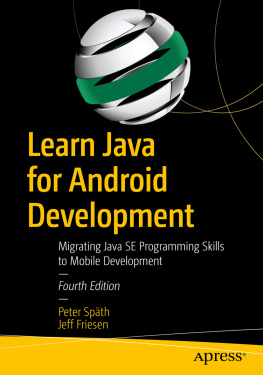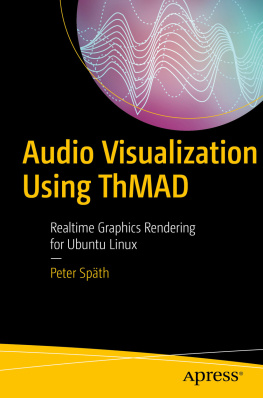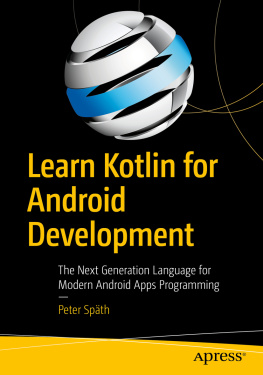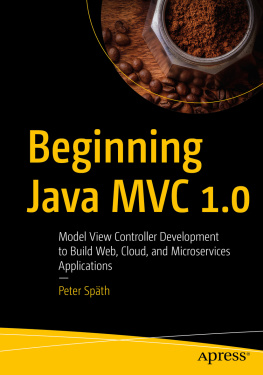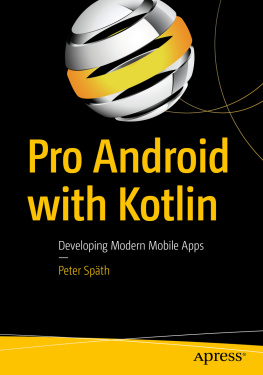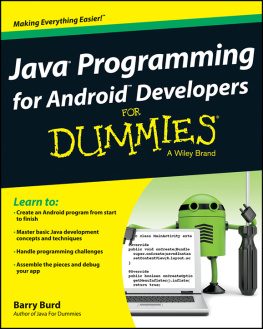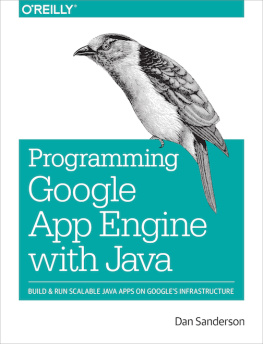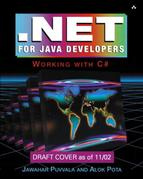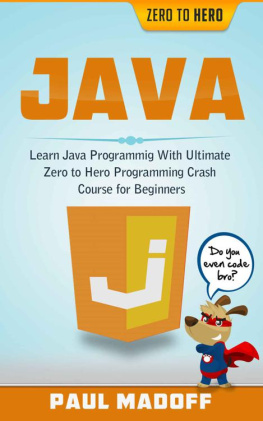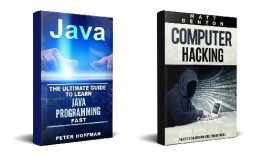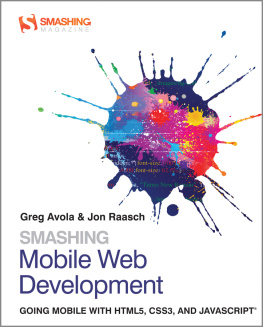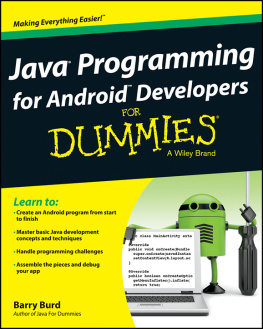Peter Späth - Migrating Java SE Programming Skills to Mobile Development
Here you can read online Peter Späth - Migrating Java SE Programming Skills to Mobile Development full text of the book (entire story) in english for free. Download pdf and epub, get meaning, cover and reviews about this ebook. year: 2020, publisher: Apress, genre: Home and family. Description of the work, (preface) as well as reviews are available. Best literature library LitArk.com created for fans of good reading and offers a wide selection of genres:
Romance novel
Science fiction
Adventure
Detective
Science
History
Home and family
Prose
Art
Politics
Computer
Non-fiction
Religion
Business
Children
Humor
Choose a favorite category and find really read worthwhile books. Enjoy immersion in the world of imagination, feel the emotions of the characters or learn something new for yourself, make an fascinating discovery.
- Book:Migrating Java SE Programming Skills to Mobile Development
- Author:
- Publisher:Apress
- Genre:
- Year:2020
- Rating:3 / 5
- Favourites:Add to favourites
- Your mark:
- 60
- 1
- 2
- 3
- 4
- 5
Migrating Java SE Programming Skills to Mobile Development: summary, description and annotation
We offer to read an annotation, description, summary or preface (depends on what the author of the book "Migrating Java SE Programming Skills to Mobile Development" wrote himself). If you haven't found the necessary information about the book — write in the comments, we will try to find it.
Peter Späth: author's other books
Who wrote Migrating Java SE Programming Skills to Mobile Development? Find out the surname, the name of the author of the book and a list of all author's works by series.
Migrating Java SE Programming Skills to Mobile Development — read online for free the complete book (whole text) full work
Below is the text of the book, divided by pages. System saving the place of the last page read, allows you to conveniently read the book "Migrating Java SE Programming Skills to Mobile Development" online for free, without having to search again every time where you left off. Put a bookmark, and you can go to the page where you finished reading at any time.
Font size:
Interval:
Bookmark:
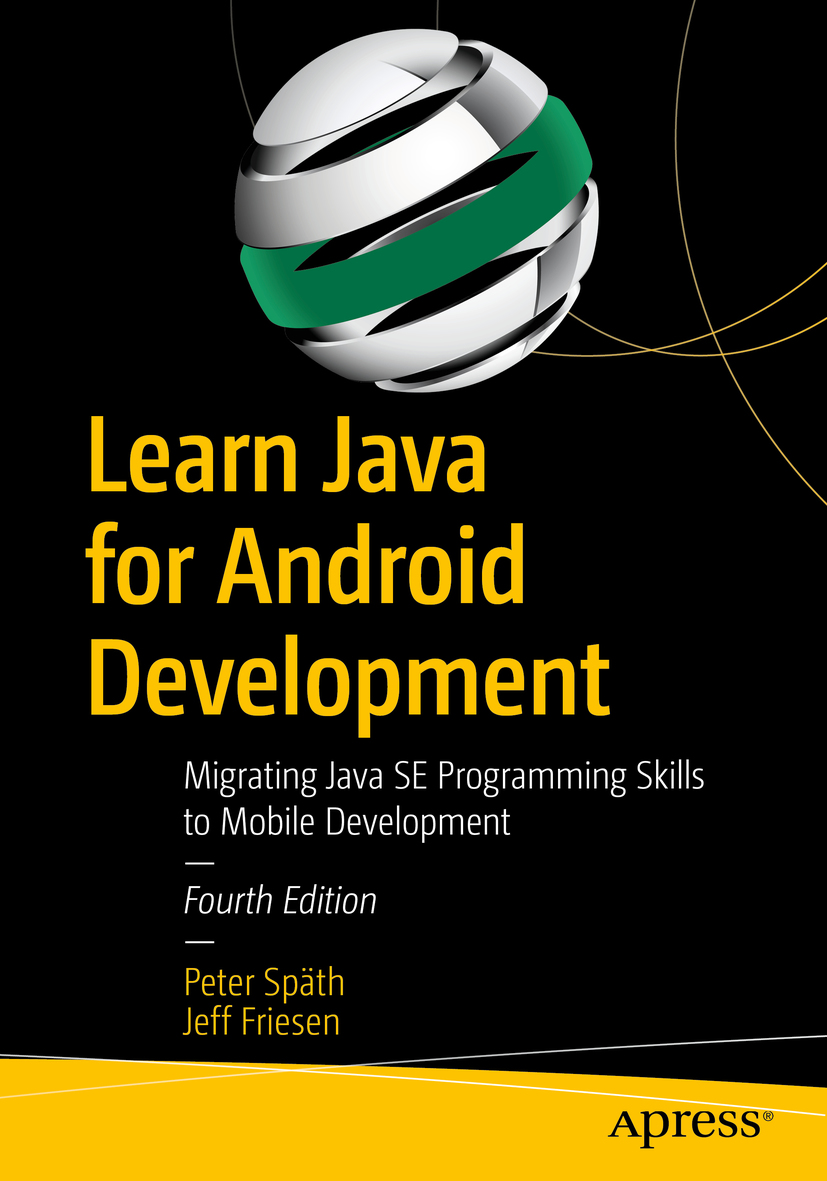

Any source code or other supplementary material referenced by the author in this book is available to readers on GitHub via the books product page, located at www.apress.com/9781484259429 . For more detailed information, please visit http://www.apress.com/source-code .
Smartphones and tablets are all the rage these days. Their popularity is largely due to their ability to run apps.
Android app developers are making money by selling such apps or intra-app features.
In todays challenging economic climate, you might like to try your hand at developing Android apps and generate some income. If you have good ideas, perseverance, and some artistic talent (or perhaps know some talented individuals), you are already part of the way toward achieving this goal.
Most importantly, youll need to possess a solid understanding of the Java language and foundational application programming interfaces (APIs) before jumping into Android. After all, many Android apps are written in Java and interact with many of the standard Java APIs (such as threading and input/output APIs).
We wrote Learn Java for Android Development to give you a solid Java foundation that you can later extend with knowledge of Android architecture, API, and tool specifics. This book will give you a strong grasp of the Java language and the many important APIs that are fundamental to Android apps and other Java applications. It will also introduce you to key development tools.
With current Android versions, the new features Java 8 introduced also entered the Android development world. For this reason, Java 8 features were added in the new book edition, namely, functional programming aspects, the streaming API, the new date and time API, and JSON handling. To streamline the book, more or less verbatim copies of parts of the official documentation were replaced by small URL references. Besides, corner cases, while valuable for certain development scenarios, were removedafter all the book is targeting Java beginners and all too advanced topics might confuse more than help to learn Java fundamentals.
Having the official Java documentation open in a browser window while reading the book certainly is a good idea.
Android meanwhile has become the most important smartphone development platform, so if you want to learn smartphone app development, starting with a decent Android version and for the very popular Java platform is a very good idea.
We hope the new book release will help you to readily acquire enough Java language programming skill, so you can explore the fun of Android application development soon.
The first edition of this book was organized into 10 chapters and 1 appendix. The second edition was organized into 14 chapters and 3 appendixes. The third edition was organized into 16 chapters and 2 appendixes with a bonus appendix on Android app development. For the fourth edition, a new Chapter were moved at appropriate places in the other chapters. Each chapter in each edition offers a set of exercises that you should complete to get the most benefit from its content. Their solutions are presented in Appendix A.
Chapter introduces you to Java by first focusing on Javas dual nature (language and platform). It then briefly introduces you to Oracles Java SE and Java EE editions of the Java platform. You next learn how to download and install the Java SE Development Kit (JDK), and you learn some Java basics by developing and playing with three simple Java applications. After receiving a brief introduction to the Eclipse IDE, you receive a brief introduction to Android.
Chapter starts you on an in-depth journey of the Java language by focusing on language fundamentals. You first learn about simple application structure and then learn about comments, identifiers (and reserved words), types, variables, expressions (and literals), and statements.
Chapter .
Chapter s pool of object-based knowledge by introducing you to the language features that take you from object-based applications to object-oriented applications. Specifically, you learn about features related to inheritance, polymorphism, and interfaces. While exploring inheritance, you learn about Javas ultimate superclass. Also, while exploring interfaces, you discover why they were included in the Java language; interfaces are not merely a workaround for Javas lack of support for multiple implementation inheritance, but serve a higher purpose.
Chapter introduces you to four categories of advanced language features: nested types, packages, static imports, and exceptions.
Chapter introduces you to three additional advanced language feature categories: annotations, generics, and enums.
Chapter begins a trend that focuses more on APIs than language features. This chapter first introduces you to Javas Math-oriented types. It then explores Number and its various subtypes (such as Integer , Double , and BigDecimal ). Next you explore the string-oriented types ( String , StringBuffer , and StringBuilder ) followed by the System type. Finally, you explore the Thread class and related types for creating multithreaded applications.
Chapter continues to explore Javas basic APIs by focusing on the Random class for generating random numbers; the References API, Reflection, and the StringTokenizer class for breaking a string into smaller components; and the Timer and TimerTask classes for occasionally or repeatedly executing tasks.
Font size:
Interval:
Bookmark:
Similar books «Migrating Java SE Programming Skills to Mobile Development»
Look at similar books to Migrating Java SE Programming Skills to Mobile Development. We have selected literature similar in name and meaning in the hope of providing readers with more options to find new, interesting, not yet read works.
Discussion, reviews of the book Migrating Java SE Programming Skills to Mobile Development and just readers' own opinions. Leave your comments, write what you think about the work, its meaning or the main characters. Specify what exactly you liked and what you didn't like, and why you think so.

